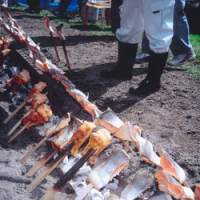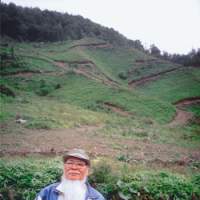In 1669, the Ainu leader Shakushain, who rose up and united the Ainu in rebellion against Japanese invaders, was called on to observe a truce, and invited to a banquet in his honor. The Matsumae clan, who had established a foothold on the island then called Ezo, now Hokkaido, by building a castle in 1601, had been cheating and robbing the Ainu in their lucrative trade for dried kelp and salmon, and the skins of deer, bear and sea otter. This and other gross injustices spurred the otherwise peaceful Ainu, the original inhabitants of Hokkaido, to pick up their swords, spears and hunting bows to fight the powerful Japanese feudal clan.
Even though members of the Matsumae clan by this time carried firearms, the Ainu knew their country and were fighting a guerrilla war that was proving very costly to the Japanese. Consequently, orders came from the Shogun to quickly subdue this rebellion and take over the resource-rich northern island. Not being able to defeat Shakushain, who was the first Ainu leader to gather the scattered tribes together, the Matsumae leaders called for a truce and laid on a great banquet — then they murdered him with poison.
A great statue has been erected in honor of Shakushain in Mauta Park in Shizunai, Hokkaido. Every year, on Sept. 23, Ainu from all over Hokkaido, and anybody else who wants to join in, gather to remember the leader and share in traditional Ainu prayers and ceremonies, songs, dances and tons of delicious Ainu food, such as charcoal-broiled salmon.
I have been friends with Ainu folk for close on 30 years, and I attended the celebration this year partly to record it for the third episode of an NHK World series that I have been presenting in both English and Japanese (the previous two were on the World Heritage Kumano pilgrimage route in Wakayama Prefecture, and on the origins of Okinawan karate). I was deeply moved to be asked to don Ainu ceremonial robes and headgear and to join in the ceremonies as an "honorary Ainu."
It was a wonderful day and I met many old friends, one of them being the Ainu ekashi (elder) Haruzo Urakawa, a wonderful man who moved to Chiba Prefecture some years ago but who has maintained his Ainu beliefs and ceremonies. A few years back Urakawa opened the annual Tokyo Earth Day celebrations, of which I happen to be the chairman, with an Ainu prayer.
When we met at the Shakushain celebrations, Haruzo (as he prefers to be called) told me about the ceremonies he was holding to celebrate and give thanks for the return of the salmon. The long struggle for the right to conduct these ceremonies has been a thorn in the side of many Ainu leaders, including the late, great Shigeru Kayano, the first Ainu leader to be elected to the Diet (Japan's national parliament).
For many years the Ainu were forbidden to hold any traditional ceremonies, even funeral rites, and although the right to conduct a salmon thanksgiving ceremony has been granted by the Japanese government in recent years, Tokyo has continued to be downright mean and stingy, allowing only a ridiculously small number of wild salmon to be taken in the traditional ways dictated by the ceremony and the whole Ainu people.
Prejudice and the denial of rights to the Ainu have continued long after they were deprived of their land, hunting and fishing rights. It is a truly disgraceful record for the Japanese government, which still refuses to recognize the Ainu as an indigenous people, despite a United Nations Declaration that insists on recognition for these rights.
Currently, a handful of very courageous Japanese politicians are standing up for the Ainu, but they seem to be swamped by the complacency of the majority. Ainu culture, art and their deep ties to their natural and spiritual world are surely a great enrichment to Japan as a whole. The proud resurgence among young Ainu to learn their ancient language, songs and stories is very pleasing to see. I won't go into it here, but I have personally witnessed arrogant prejudice against the Ainu, at an international conference of all places, and as a Japanese citizen it made me very angry indeed. If the Canadian government tried to do the same sort of thing nowadays with the First Nations folk, they would really and truly get their knickers in a twist.
It was courageous of NHK to let this old red devil present the Ainu documentary, and I worry a little that the director and producer will be putting their necks on the line should they let some of the truth come out as I tried to present it.
We did indeed film the salmon ceremony, which got us all up at 4 a.m. to be by the mouth of the Urakawa River by dawn. Although nearly all the Hokkaido rivers, like rivers all over Japan, have been dammed and otherwise interfered with so as not to allow wild salmon to return to their original spawning sites, some salmon do return to the Urakawa River. They can swim a few miles up, where a ridiculous concrete construction, which cost billions of yen to build, stops them going any further. The official policy in Japan is to catch all the returning salmon possible, and to milk them of eggs and milt to raise the fry in hatcheries. Although some raising of salmon fry for release to the sea or for commercial fish farms can be economically sensible, it is ecologically foolish not allow at least a percentage of a salmon tribe to retain its vigor by fighting through their whole wild, beautiful, ancient and original life cycle, back to natural spawning beds, large and small.
While we were filming the salmon ceremony, I noticed a dozen or so Japanese men fishing in the mouth of the Urakawa River, snagging the returning salmon with lures. Although this is against the law, the practice continues all over Hokkaido and the salting and bottling of the returning salmon's eggs is notorious. In many cases the rest of the fish gets tossed away. The poachers I saw were taking the whole salmon to the trunks of their cars, glancing suspiciously at me. They knew what they were doing was against the law, but they were laughing about it. Had they been caught doing this in Canada, not only would they get a big fine but their gear would like as not be confiscated, too — including their vehicles.
Here, Japanese officialdom turns a blind eye to poaching, whether of wild salmon, rare flowers and insects or whatever. But it still niggles and haggles about traditional Ainu fishing rights.
That day, Haruzo insisted that I should accompany him to see a situation in the headwaters of the Urakawa River, deep in the mountains in what the Ainu consider to be sacred ground. We spent more than an hour bumping along a narrow logging road, passing a huge concrete monstrosity being constructed deep in the mountains where once the river had been clear, rushing and pristine. This blight is supposed to stop flash floods that can bring dangerous debris, mud and rocks down from the mountain. For thousands of years such construction was not necessary, but in recent decades it is public works like this that have brought in money for local politicians and their cronies.
We drove on past this man-made ugliness until we came to what Haruzo wanted to show me. He got out of the vehicle and spread his arms with an expression of disgust on his face. A whole mountainside had been denuded of trees and crisscrossed with bulldozer scars. Already the streams were running the color of miso soup with the erosion.
This had been natural mixed forest, in a scenically spectacular part of Hokkaido that is a vital watershed rich in wildlife. Haruzo was bitter with grief and subdued anger. He had logged in this area as a young man, but back in those days they didn't destroy the whole mountainside. Who does it now? Who has been doing it for the last 30 years and more? The Japanese government's Forestry Agency!
The value of timber extracted, most of it going for pulp, would not even pay the cost of building the logging road. As I see it, the logging road was built to justify the hideously expensive construction of the concrete monster across the river. Such insane logging practices are, in my opinion, criminally irresponsible. They destroy habitat, and the ensuing erosion will probably make it very difficult for trees to grow back.
I've seen this combination of idiotic logging practices and ensuing, sometimes preceding, construction of stream blockages all over Japan. When will it stop? I'm afraid it won't until taxpayers wake up and realize that their government is spiritually and financially bankrupt.
I'm glad Hokkaido is part of Japan, not Russia, but I'll raise my glass and whisper "Banzai" to the spirit of Shakushain.





